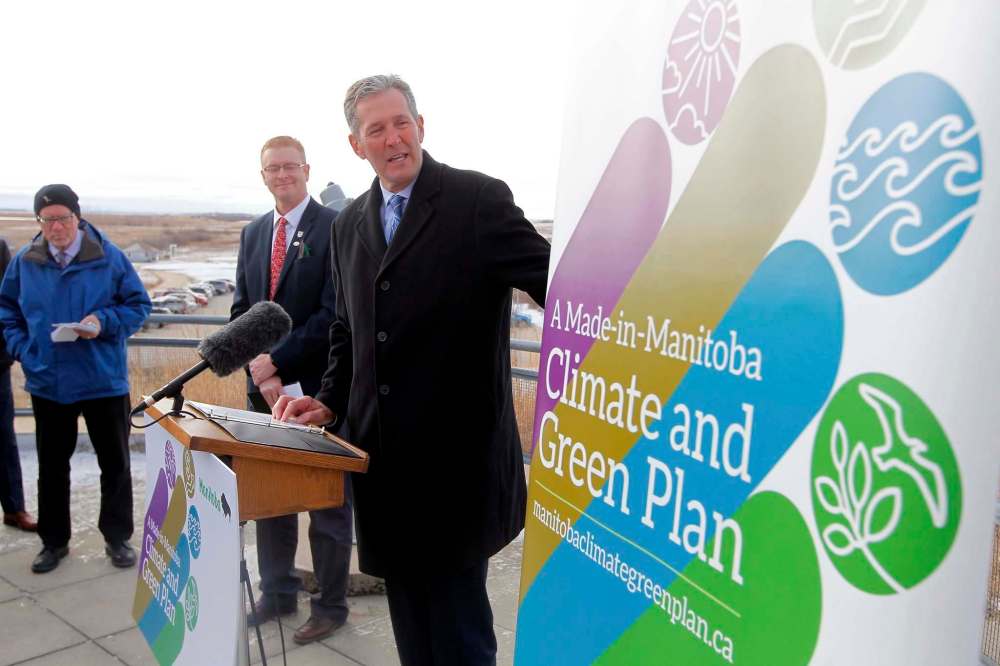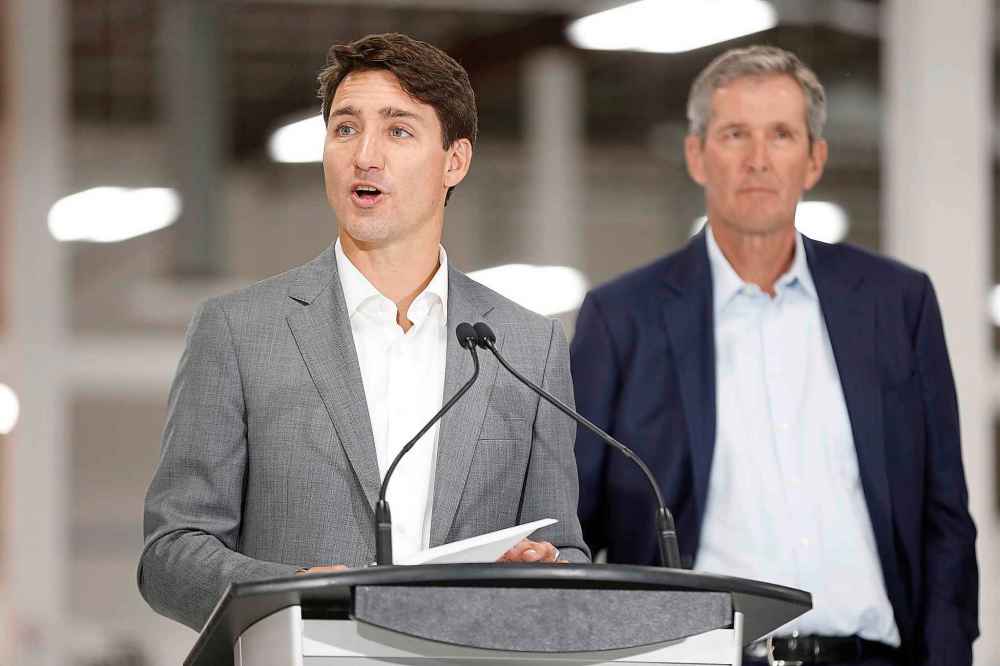Pallister’s new stance on carbon tax seems like hot air
Read this article for free:
or
Already have an account? Log in here »
To continue reading, please subscribe:
Monthly Digital Subscription
$1 per week for 24 weeks*
- Enjoy unlimited reading on winnipegfreepress.com
- Read the E-Edition, our digital replica newspaper
- Access News Break, our award-winning app
- Play interactive puzzles
*Billed as $4.00 plus GST every four weeks. After 24 weeks, price increases to the regular rate of $19.00 plus GST every four weeks. Offer available to new and qualified returning subscribers only. Cancel any time.
Monthly Digital Subscription
$4.75/week*
- Enjoy unlimited reading on winnipegfreepress.com
- Read the E-Edition, our digital replica newspaper
- Access News Break, our award-winning app
- Play interactive puzzles
*Billed as $19 plus GST every four weeks. Cancel any time.
To continue reading, please subscribe:
Add Winnipeg Free Press access to your Brandon Sun subscription for only
$1 for the first 4 weeks*
*$1 will be added to your next bill. After your 4 weeks access is complete your rate will increase by $0.00 a X percent off the regular rate.
Read unlimited articles for free today:
or
Already have an account? Log in here »
Hey there, time traveller!
This article was published 19/02/2019 (2419 days ago), so information in it may no longer be current.
Come again?
Four months after a surprise decision to kill a much-ballyhooed “made-in-Manitoba” carbon tax plan, Premier Brian Pallister has suggested in an interview with Bloomberg News that he may still introduce a carbon levy if Ottawa meets some of his conditions.
Pallister told Bloomberg in a February 15 interview he was now prepared to renegotiate the rate of carbon tax that would ultimately be levied in Manitoba. That would seem to imply that Pallister would, of his own volition, levy a carbon tax on Manitobans, something that many people in his home province thought was no longer a possibility.
If you’re confused, you’re not alone.
Ever since he pulled the plug on his own carbon tax plan last fall, it has been difficult to figure out exactly what Pallister was trying to accomplish, let alone how he was going to accomplish it. These latest comments to Bloomberg serve mostly to add more mud to an already muddy body of water.
To fully appreciate the level of confusion in effect here, you need to go back to the very origins of Manitoba’s carbon tax plan.

The Manitoba Green Plan, as it was called, represented nearly two years of heavy slogging by the new government. When it was finally revealed, it contained plans for a flat $25-per-tonne levy on carbon that would have funded tax cuts and emission-reduction initiatives.
The sticking point was Pallister’s insistence the Manitoba’s levy would not rise above $25 per tonne. This put Manitoba at odds with the federal Liberal government, which had already announced expectations that all provinces would have carbon taxes equal to $50 per tonne by 2022.
This was the context for a face-to-face meeting between Pallister and Prime Minister Justin Trudeau last September. The two leaders shared a podium at a photo-op event at Winnipeg’s Canada Goose garment factory. Then, later in the day, they had a one-on-one meeting at the Manitoba Legislature.
Although Trudeau stuck closely to his extremely diplomatic patter, he did strongly suggest that in his view, Manitoba’s position would have to change in the future.
That seemed to provoke Pallister to no end. “To have the federal government threaten to … double up on our carbon tax is not helpful,” he said after the meeting.

Slightly less than a month later, Pallister announced Manitoba was pushing ahead with a climate change plan that did not include a carbon tax. “We say yes to a made-in-Manitoba green plan without a carbon tax,” he said at the time.
Pallister’s explanation didn’t seem to make sense. He had commissioned a legal opinion that showed very clearly that Manitoba could not stop Ottawa from imposing a national carbon tax. However, if any province introduced their own climate change plan that put a price on carbon, it might be possible to resist the imposition of national levels of taxation.
In other words, as long as you’re in the climate change game, you have a legal basis on which to fight Ottawa.
However, Pallister’s decision to withdraw his own carbon tax left the province completely vulnerable to the federal levy. Ottawa has already confirmed plans to levy the national tax on April 1 of this year and then remit rebates to all Manitobans directly, bypassing the provincial treasury.
Pallister also weakened Manitoba’s legal position by eliminating the one argument — we’ve already got a plan, thanks — that their own experts said could be potentially effective at staving off the $50-per-tonne levy.
And now, has anything really changed?
“Manitobans deserve to know whether their premier still supports the entire notion of a carbon tax. And whether he will, or won’t, impose a carbon tax sometime in the future. “
The Bloomberg story certainly suggested that Manitoba was interested in discussing changes to its own plan as long as Ottawa was willing to move from its hard and fast backstop strategy. But maybe Pallister was only suggesting that he might breathe life into his own plan as long as Ottawa agreed to end the backstop threat.

The problem here is we’re all trying to make some sense out of a strategy that has been completely non-sensical. This most recent interview on carbon taxes is further proof that there may be master strategy in Pallister’s current position.
Pallister said he introduced a carbon tax plan because he thought it was good policy, and that it would help Manitoba reduce emissions and remain competitive when compared to other provinces. He certainly made sense when he argued that his province, which has a very small carbon footprint when compared to larger provinces, should not have to pay the same level of carbon tax.
However, Pallister has failed to provide a salient argument for withdrawing his own plan and letting the Trudeau Liberals step in and fill the carbon tax gap. In the Bloomberg interview, the premier said he was destined to cross swords with Trudeau at some point over federal carbon tax demands, and “if I’ve got to fight him in a year I might as well fight him now.”
No, it doesn’t make any sense to fight Ottawa now. The only advantage Manitoba would have in any “fight” would be to defend an existing Manitoba carbon tax against the imposition of a federal levy. And Pallister has already ceded that advantage.
Manitobans deserve to know whether their premier still supports the entire notion of a carbon tax. And whether he will, or won’t, impose a carbon tax sometime in the future. Right now, all we’ve got is hot air and obfuscation.
Given what is at stake — our climate — that is hardly an adequate response.
dan.lett@freepress.mb.ca

Dan Lett is a columnist for the Free Press, providing opinion and commentary on politics in Winnipeg and beyond. Born and raised in Toronto, Dan joined the Free Press in 1986. Read more about Dan.
Dan’s columns are built on facts and reactions, but offer his personal views through arguments and analysis. The Free Press’ editing team reviews Dan’s columns before they are posted online or published in print — part of the our tradition, since 1872, of producing reliable independent journalism. Read more about Free Press’s history and mandate, and learn how our newsroom operates.
Our newsroom depends on a growing audience of readers to power our journalism. If you are not a paid reader, please consider becoming a subscriber.
Our newsroom depends on its audience of readers to power our journalism. Thank you for your support.









